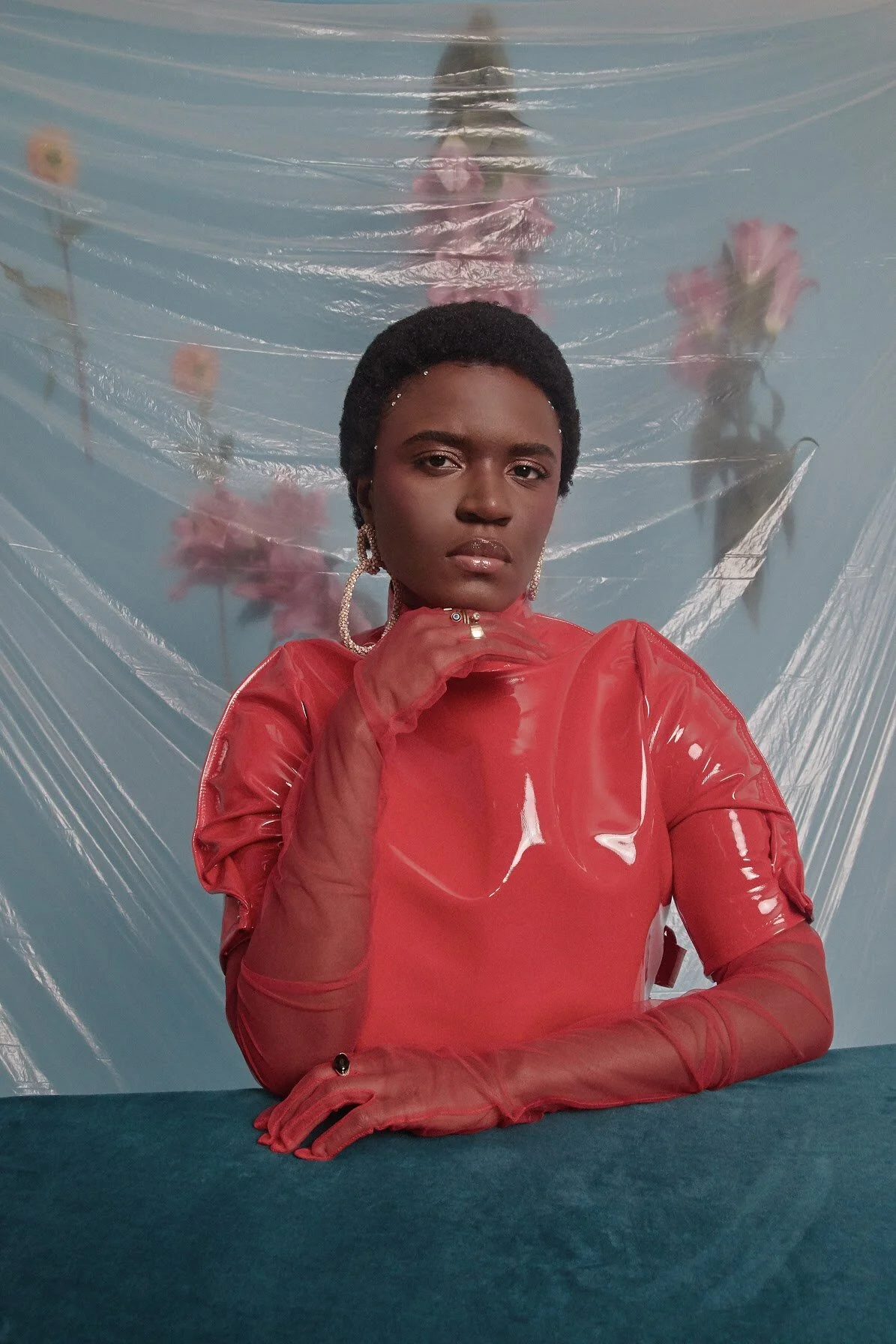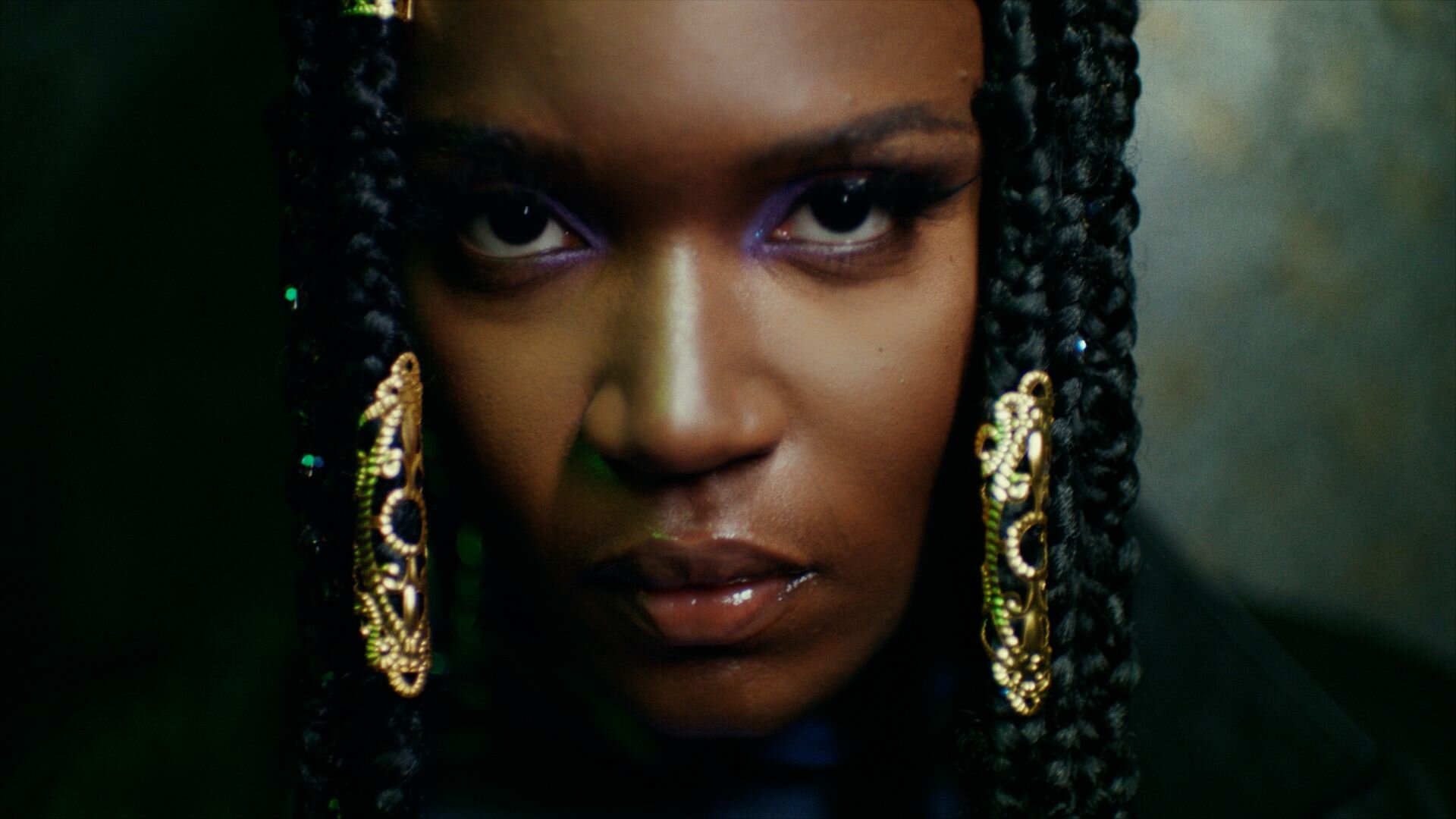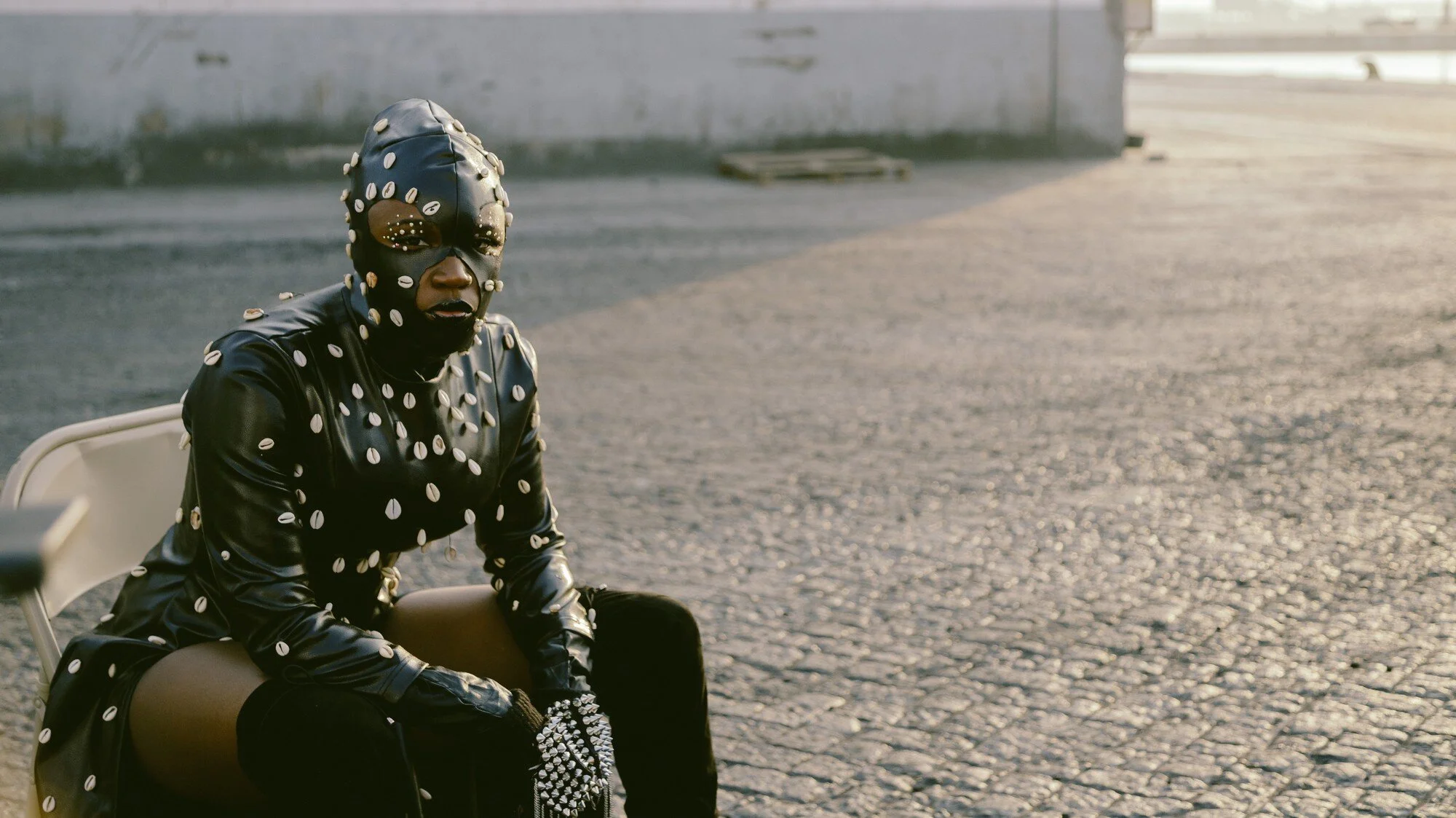
Photographer Philipp Raheem
The Ghanaian-American artist on redefining what it means to be a contemporary West African musician making African music.
words Elvira Vedelago
Ahead of the release of her new LP a few weeks ago, Ghanaian-American artist Amaarae had been described as “the future”, “in a lane of her own”, and a musical risk-taker bringing the heat to a new school of Ghanaian sound by her contemporaries. Born Ama Serwah Genfi in New York, and moving homes between Accra, New Jersey and Atlanta, the then 23-year-old burst onto the African music scene with the release of her debut EP Passionfruit Summers in 2017. Hosting influences from neo-soul to trap and hip-hop, the project was a musical melting pot existing beyond singular classification and undoubtedly rooted in her exposure to contrasting cultures and experimentation with distinct sounds throughout her childhood. Now, easily recognised for her sultry vocals, provocative lyrics that centre themes of desire and striking visuals that often address issues of representation, Amaarae has quickly established herself as a key player in the alternative music scene coming out of the African continent, joining the vanguard of young African artists charging a cultural movement which seeks to challenge conservative attitudes and champion freedom of expression.
The release of her genre-defying album this November, titled The Angel You Don’t Know, has further cemented Amaarae as a fresh and exciting African talent, as she masterfully fuses and effortlessly shifts between Afrobeats, punk rock, rap, dancehall, and R'n'B across the 14 tracks. Upping the anté with both her sound and her visuals for this project, Amaarae takes her audience on a surreal, escapist journey navigating themes of sensuality, sexuality and brazen hedonism bound and delivered as a message of self-empowerment for West African women - her opening track on the album, D*A*N*G*E*R*O*U*S, fiercely proclaiming “fuck it up sis” as her feminist battlecry.
In an interview held over Zoom from her home in Ghana, the artist discusses the new album release, the mixed responses to her art and how she is redefining what it means to be a contemporary West African musician making African music.

Creative Director Amarachi Nwosu, Photographer Philipp Raheem, Stylist Danielle Temeng, Stylist Assistant Yasmin Harris, MUA Sonika Sunar, Set Design Ella Pavlides
Elvira: Your new project launches this week. How do you feel about it being released?
Amaarae: I'm excited for people to hear it because I've been teasing it a lot over the last couple of months.
The music is really good, I’ve enjoyed listening to it. Online, you describe it as entering into a darker world. In what way is this project darker?
I think in terms of the tone and the mood. But it’s ballsy as well. It has acidic tones. The next one is going to go even darker.
Why did you feel like you wanted darker tones for this project?
I think it’s [because] on the outside I had the colourful hair and my clothes are always colourful and bright, [so] people expect me to be colourful and bright on the inside. But I’m dark. I want people to hear and feel more of that darkness and edginess within.
You also talk about this project feeling like “space to breathe” in the current climate. Do the darker tones portray a form of escapism?
A lot of this project was so indulgent, especially for me. The themes are everything from love to drugs to being in spaces where you’re not cognisant of anything that’s happening. It’s absolutely escapist, everything from the way that it starts, to the way that D*A*N*G*E*R*O*U*S feels, where it’s really in your face [and] punk rock. The whole purpose of this project is for you to not really be here with the rest of the world.
“I like to give room for everyone to exist within my visual world. It’s not just women but it’s transgender people, it’s people of different sexualities, whether you’re bisexual [or] homosexual. I think I’m building worlds in the visuals in the way that I would like to [see] the world.”
Often your sound is described as sexy, sultry, seductive which comes through in your visuals too. For example, the themes of desire but also playfulness and fluidity in the expression of sexuality and sexual agency. Why do you feel it’s important to push that message through your visuals?
It’s interesting working in the space that I’m working in, being a West African living in West Africa and making the sort of music [I make] but also the visuals that accompany the music. I think it’s important to push those boundaries visually because, except for one or two artists, I keep seeing the same themes in West African music videos. Some of the storytelling is immaculate and some of the ways the shots are lit and the ways the videos are directed are beautiful. But then the messaging and the substance is still lacking. So I feel like I want to give, especially women, something new to look at. Something new to ponder and think about when it comes to their own agency, whether it be sexual, emotional, mental, spiritual. Empowering people through the visuals has been the most important aspect for me. And I like to give room for everyone to exist within my visual world. It’s not just women but it’s transgender people, it’s people of different sexualities, whether you’re bisexual [or] homosexual. I think I’m building worlds in the visuals in the way that I would like to [see] the world.
Jumping Ship is your latest video to drop. Tell us a bit about the storyline.
Jumping Ship is similar to Like It. It’s about desire and chasing something you can’t necessarily find or have. With the visuals, what I wanted to communicate was the uncertainty and the power of being able to wield uncertainty to find new experiences, to push your comfort zones [and] to push your own [sense of] adventure and exploration. I think that’s not being done enough in West African visuals. People aren’t pushing the subconscious. Every time I’m in a video, I’m really going on an adventure and it’s just me trying to subconsciously tell fans [to] explore.
JUMPING SHIP (Official Video)
Who do you have in your mind when you’re pushing that message?
First and foremost, kids. Even though the visual content sometimes is a bit risky. I started to build my identity and curiosity through interesting music videos when I was a kid. I remember Marilyn Manson had this one insane video [and I was] so intrigued by it. Missy Elliot is a reference for almost everybody. I want to blow [the next generation’s] minds wide open so that they understand [that] almost anything is fathomable. I think for the next generation, I don’t want my art to be a form of blockage. I just want it to be an open world and an open book where you can insert yourself and insert your own imagination.
It also speaks to older generations. A lot of my friends here in the UK loved the visuals for Fancy and felt excited to see a young West African woman push boundaries in the way you’re doing that. What has the response been like in Ghana?
In Ghana, I believe Like It is banned from TV. [With] Fancy, they just refused. Shoutout to Nigeria though, because they are showing a lot of love on Leave Me Alone and Fancy - the video and the singles.
Does it make you feel sad or disappointed that Ghana[’s music stations have] reacted in that way?
It pisses me off. Like what I said about making visuals and trying to open the minds of younger people, especially young girls in West Africa. I need them to have access to those options so that they know that outside of everything that they see, it’s possible to be something different. It really upset me when they censored my videos on local television because I’m like, what is the point of what I’m doing? Kids in America [or in the UK] have YouTube so even if you censor it on TV, those kids will find me. That’s not the core reason why I’m doing that. It’s [for] the girls here [in Ghana] that only have access to local programming because they need to see that there is another option besides what they see every day. It hurts me that in my own homeland they censor my art. I guess whoever is meant to find it will find it but it’s such a shame. There’s only one archetype of female artist that they allow to thrive or to breakthrough.
FANCY (Official Video)
How have your family responded to your music, especially considering that this project is darker?
My mum is super supportive [and], especially as an African parent coming from the generation that she comes from, has done a really good job at slowly building liberal views. She’s listened to my album [and] she loves it. I know she really likes Celine. What she had a problem with was how dark the album art was. She [felt like I was] messing with themes of juju. I’m like, bro chill. It’s a new and fresh experience. [It’s] not everyday take a picture of the artist and go and use it to do cover art. Let’s explore some new shit. I feel like I’m very misunderstood and my intentions are almost always misconstrued as an artist when it comes to [engaging] with Africans because they think that I just want to do things that upset the status quo. [But] it’s just a new way of thinking. I’ve seen cover art by Outkast, Led Zeppelin, Jimi Hendrix, Osibisa and those things have been like portals for me to open my mind to new possibilities. So as an artist, I need to do that for other people too. That’s all that it is, just opening portals to new possibilities.
Do you feel it’s harder to manage expectations because you’re a girl?
I’m the most rebellious spirit in my family so I didn’t give a fuck about anyone’s expectations. One thing I didn’t allow to chain me down was the typical pressure of the West African household and the expectations they place on daughters. I was not having it.
On the reverse, do you feel like you’re challenging Western views and expectations of West African women with your art?
I think my art is less challenging Western views of West African women and more so marrying the two cultures together and bringing the different understandings that I have of those two worlds together. I was born in New York, I was raised in Ghana for a while but I was also partially raised in Atlanta. That’s an amalgamation of who I am as a person. I understand the West and then I understand Africa as well. I fuse both of those worlds together through my music and through my visuals. So I think in some way, I’m creating a better understanding of what it means to be a multifaceted woman who can do whatever they want in as many different ways as possible.
“I think in some way, I’m creating a better understanding of what it means to be a multifaceted woman who can do whatever they want in as many different ways as possible.”
You’ve previously mentioned with this project wanting to redefine what it means to make African music. Why do you feel like you want to redefine it and how do you feel you’ve done that?
I think as an African artist, with all respects to the genre, we can’t always be singing for you to wind your waist. We can vary the themes, let’s switch it up. For me, I feel like my contribution to this project is to show you all the different ways Afropop can go without you even actively knowing that this is how those themes are being implemented. I consider my album an Afropop album but there’s still tropes of rap, punk rock, indie rock, pop. It’s everything but at the end of the day, at its core, it’s still African music being created by an African with an African perspective and experience. But I wanted to show people that we can do all of this, it can be a wide array of genres and themes that we play with.
It’s cool that you’re trying to do that. Looking to the future, what do you want your legacy to be?
Ultimately, I want to be one of, if not, the first African artists to fully actualise their brand. You know how Tyler the Creator has clothes, music, all types of different things he’s into. I want to diversify my career in that way but at the core, I want things to still be with the African audience in mind and opening up the experience of the African audience. I’d like to go into mentoring and philanthropy for young African women. I genuinely want to make African society better through my music and my legacy.
Stream ‘The Angel You Don’t Know’ here.


